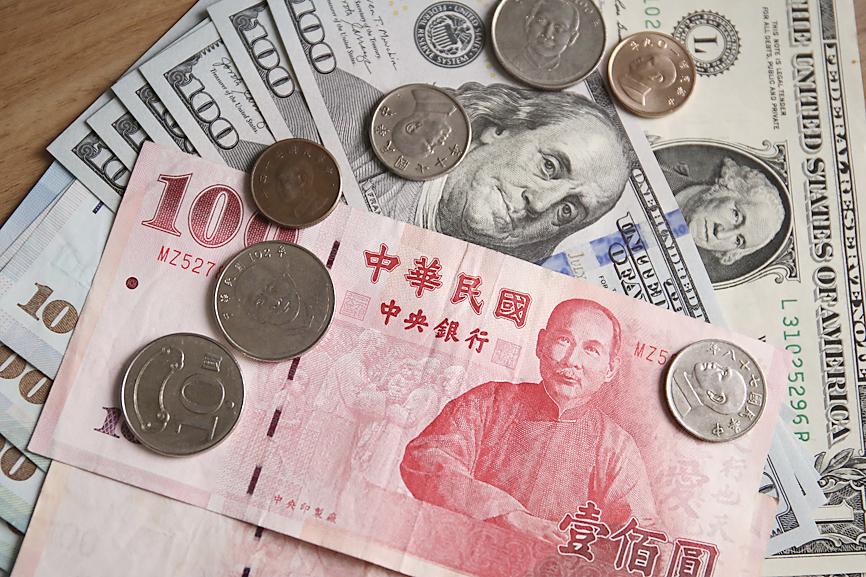The New Taiwan dollar yesterday weakened 0.5 percent, or NT$0.144, to NT$29.05 in Taipei trading, the lowest in more than 18 months, as foreign players slashed holdings in pursuit of higher yields elsewhere, dealers said.
It is the first time since September 30, 2020, that the local currency ended weaker than NT$29 against the US dollar, the central bank’s Web site showed.
Combined turnover at Taipei Forex Inc and the smaller Cosmos Forex Inc totaled US$2.49 billion.

Photo: CNA
The NT dollar’s decline has much to do with global funds redeploying assets after central banks announced monetary tightening policies, currency traders said.
For example, the US Federal Reserve said that it would raise interest rates at each policy meeting this year, with analysts looking at a rate hike of 50 basis points next month to help rein in runaway consumer prices and production costs.
Expectations of rate increases prompted foreign players to cut local shares by a net NT$34.04 billion yesterday as higher yields wooed assets, traders said.
Lockdowns throughout China also fueled concern that Taiwanese firms that operate in China could take a hit, traders said.
Financial Supervisory Commission Chairman Thomas Huang (黃天牧) told a meeting of the legislature’s Finance Committee yesterday that local shares with average yields of 3.96 percent are more attractive than the 10-year US Treasury at 2.7 percent.
Local listed firms made record earnings of NT$5.2 trillion last year and are to distribute generous dividends later this year, Huang said, adding that ongoing share price corrections are likely transient in nature.
Traders said that the central bank would not let the NT dollar free-fall, but would intervene to keep it above NT$29.5.
Without intervention, the NT dollar would have dropped below NT$29.1, traders said, adding that the pressure to sell is likely to remain for the short term.

CHIP RACE: Three years of overbroad export controls drove foreign competitors to pursue their own AI chips, and ‘cost US taxpayers billions of dollars,’ Nvidia said China has figured out the US strategy for allowing it to buy Nvidia Corp’s H200s and is rejecting the artificial intelligence (AI) chip in favor of domestically developed semiconductors, White House AI adviser David Sacks said, citing news reports. US President Donald Trump on Monday said that he would allow shipments of Nvidia’s H200 chips to China, part of an administration effort backed by Sacks to challenge Chinese tech champions such as Huawei Technologies Co (華為) by bringing US competition to their home market. On Friday, Sacks signaled that he was uncertain about whether that approach would work. “They’re rejecting our chips,” Sacks

It is challenging to build infrastructure in much of Europe. Constrained budgets and polarized politics tend to undermine long-term projects, forcing officials to react to emergencies rather than plan for the future. Not in Austria. Today, the country is to officially open its Koralmbahn tunnel, the 5.9 billion euro (US$6.9 billion) centerpiece of a groundbreaking new railway that will eventually run from Poland’s Baltic coast to the Adriatic Sea, transforming travel within Austria and positioning the Alpine nation at the forefront of logistics in Europe. “It is Austria’s biggest socio-economic experiment in over a century,” said Eric Kirschner, an economist at Graz-based Joanneum

BUBBLE? Only a handful of companies are seeing rapid revenue growth and higher valuations, and it is not enough to call the AI trend a transformation, an analyst said Artificial intelligence (AI) is entering a more challenging phase next year as companies move beyond experimentation and begin demanding clear financial returns from a technology that has delivered big gains to only a small group of early adopters, PricewaterhouseCoopers (PwC) Taiwan said yesterday. Most organizations have been able to justify AI investments through cost recovery or modest efficiency gains, but few have achieved meaningful revenue growth or long-term competitive advantage, the consultancy said in its 2026 AI Business Predictions report. This growing performance gap is forcing executives to reconsider how AI is deployed across their organizations, it said. “Many companies

France is developing domestic production of electric vehicle (EV) batteries with an eye on industrial independence, but Asian experts are proving key in launching operations. In the Verkor factory outside the northern city of Dunkirk, which was inaugurated on Thursday, foreign specialists, notably from South Korea and Malaysia, are training the local staff. Verkor is the third battery gigafactory to open in northern France in a region that has become known as “Battery Valley.” At the Automotive Energy Supply Corp (AESC) factory near the city of Douai, where production has been under way for several months, Chinese engineers and technicians supervise French recruits. “They